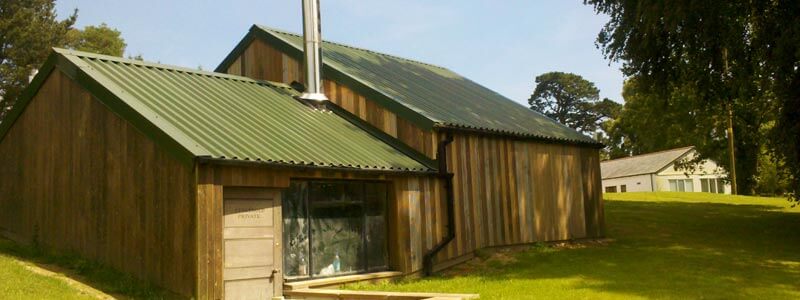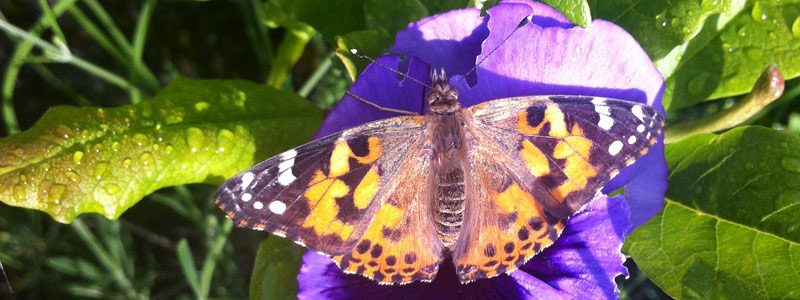Cornwall Tourism Award 2023 (Ethical and Sustainable Business)
Sustainability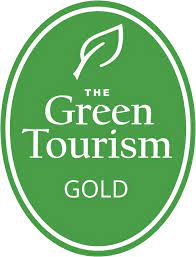
We are lucky enough to live in a beautiful part of the world, and we are committed to running Kernock Cottages and the Estate sustainably, with as little impact on the environment as possible, enabling enjoyment of the nature and biodiversity for generations.
At Kernock we have a robust sustainability policy which covers conservation, use of local produce, energy-efficiency and environmentally-friendly business practices. We want to play our part by being environmentally friendly, and at the same time to make it easy for our guests to play their part too. We are proud to hold the Gold Award from the Green Tourism Business Scheme (GTBS) – their highest award – in recognition of our sustainable ethos.
For more information see www.green-tourism.com/
Heat and Light
Installed in July 2013 the 150KW Herz woodchip biomass boiler delivers heating and hot water to all the cottages across the Estate via a district heating loop. Over a year, the system produces around 200,000kWh of heat, which represents a saving of 59 tons of carbon per annum, compared with producing that using oil. http://www.biomassenergycentre.org.uk
Electricity and eV Charging
In February 2020 a 17kW photovoltaic solar panel array was installed on the roof of our barn, which is linked to two Tesla Powerwalls. In daylights hours, we produce (depending on the sun!) at least some of our requirement every day, and when it is sunny, any excess power is stored in the Tesla Powerwalls (giant batteries, in effect) for us to use when the panels are not producing. We also have two Electric Vehicle Charging Points – a dedicated Tesla charger, and a Type-2 charger.
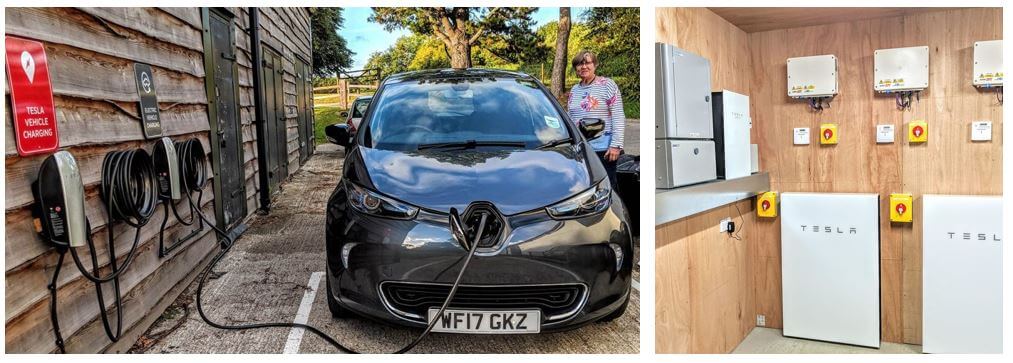
The Tesla batteries help us store power, and we have EV charging points on site
Eco lighting has come a long way in the last few years too. We have replaced all 350 (gulp) of the 50w halogen GU10s across the site with the latest SMD LED technology GU10s, which provide very good light levels instantly (gone are the days of stumbling around waiting for the bulb to heat up!). Outdoor lighting is also on movement sensors, so you don’t have to scrabble around in the dark, but also you don’t have to leave the lights on while you are out (these can also be set to “on” if you are dining al fresco and want to stay outside on balmy evenings). Most of the appliances in the cottages are A+ or A rated to minimise energy and water consumption. Our energy and water consumption are monitored to identify opportunities to reduce consumption. Energy tariffs are reviewed on a regular basis.
Water
In February 2020 we also commissioned our borehole and pump room, so we are self-sufficient in beautiful fresh Cornish water from the aquifer under our feet. Of course, the water goes through a rigorous filtration system (the control room has more high-tech kit than Doctor Who’s Tardis!), but is doesn’t contain chlorine, so tastes even better than the mains water we had before (which is excellent). We do maintain a mains backup option for emergencies.
Despite the fact that quite a lot falls out of the sky in Cornwall, we still do our best to minimise excessive use of water. We have dual flush on most of the loos (but the accessible loo has a spatula flush for ease of use), water aerators on the taps, and EcoCamel shower heads (whose Aircore Technology reduces water consumption without compromising on the shower experience… see http://www.ecocamel.com/technology).
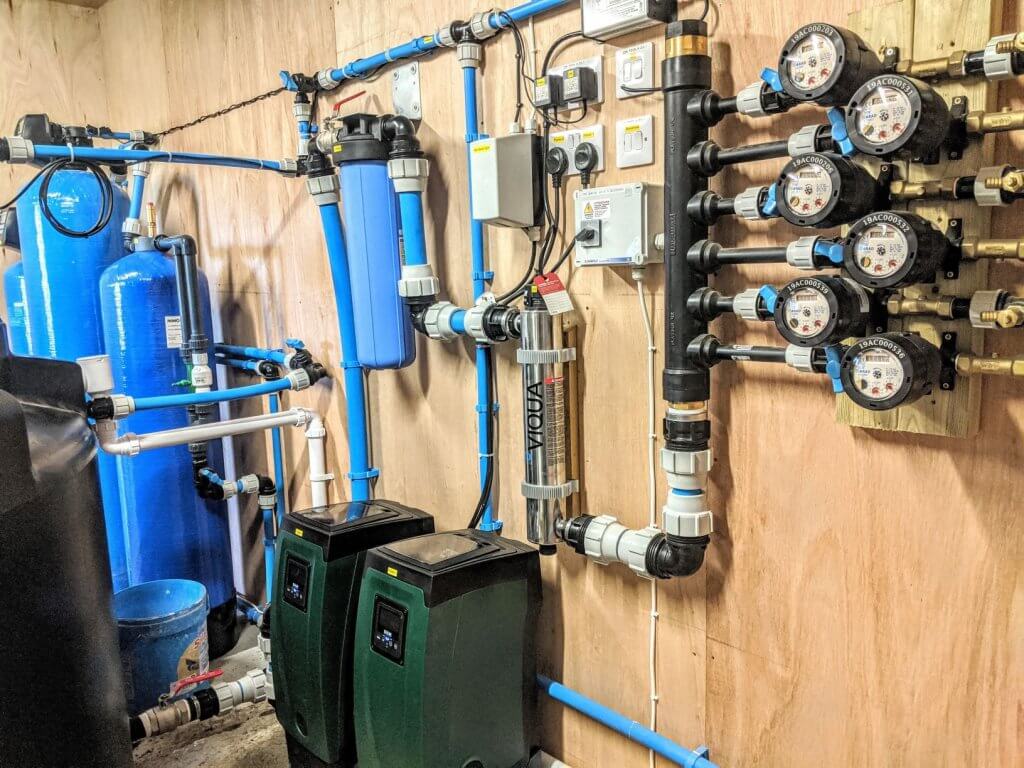
Filtration system for our aquifer water
Think Local
We use local labour and materials wherever possible for the construction and ongoing maintenance of our cottages and grounds. We try to use local suppliers for all our cleaning materials, foodstuffs etc, ensuring that we are contributing to the local economy.
Breakfast Welcome Pack – We are proud to provide our breakfast welcome packs from St Dominick Community Shop. By 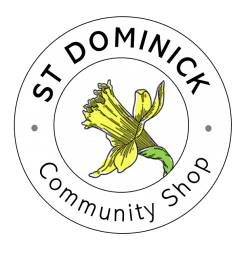 supporting this village Community Shop, we are supporting local businesses: milk and butter from a local dairy, local eggs, meat products from a local farm and bread from a local bakery. We are also contributing to supporting the community shop to build a surplus that can be reinvested for the greater benefit of all within the village. The shop runs with the support of many local volunteers and is open Monday to Saturday 9:00am to 5:30pm and Sunday 9:15am to 11:30am.
supporting this village Community Shop, we are supporting local businesses: milk and butter from a local dairy, local eggs, meat products from a local farm and bread from a local bakery. We are also contributing to supporting the community shop to build a surplus that can be reinvested for the greater benefit of all within the village. The shop runs with the support of many local volunteers and is open Monday to Saturday 9:00am to 5:30pm and Sunday 9:15am to 11:30am.
We have a great little butcher at Carkeel (most of the beef and lamb is his own, and chicken and pork is local), and also a great veggie shop there which sells local fruit & veg. For details of how to find them, please see the Local Shopping section of the Local Info tab
Wildlife and Biodiversity on the Kernock Estate
There are lots of things to see onsite and we are lucky to have a wide variety of flora and fauna on our 25 acres. We manage our land for insect and bird life under the Countryside Stewardship Scheme, so grow insect and bird-friendly plants like quinoia, sunflower, thistle (loved by goldfinches… we have whole flocks of them when the thistle is out) etc. In the winter we spread bird food in the fields, as part of our stewardship agreement. The dawn chorus is fabulous, and we get many seasonal bird visitors, including nightingale and swallows and swifts. The drumming sound of the woodpecker is heard often, and we have a vocal owl population, which you may even be lucky enough to see in your car headlights some evenings. In your cottage you will find a collection of reference books to help you identify insects, butterflies and moths, birds, animals and plants.
We have lovely wild orchids in the spring, competing with our 28 varieties of daffodil and narcissus. We also have a good repertoire of bugs and creepy crawlies, including several families of resident slow worms and have seen (rare) Oil Beetles every year for the last few years (which we report to Buglife.org.uk). We often see some fantastic caterpillars and moths (the hummingbird hawk moth being a favourite), which sometimes end up starring on our Facebook page! If you want to look a bit further then do ask to borrow our 114mm reflector telescope and take advantage of our lovely clear skies and lack of ambient light to gaze upon the heavens. We also have planispheres, so you can identify what you are looking at. Each cottage has a folder with local walks around Pillaton (cyclists and runners beware – all our roads have hills, so you may get a better workout than you anticipated!). The village is only a 10 minute walk (or stagger back home from the pub; longer if you bounce off the hedges all the way home!).
Recycling & Waste
For our waste and recycling, we use a Cornish company CTC Waste who have their own recycling facility on the Roseland Peninsula. They operate a 100% recycling, 0% to landfill policy. On site, we reuse and recycle as much as we can. The Biomass boiler house and chip store is clad in old decking, and the door to the borehole water plant room (which says “Stokehold – Private”) was in one of the barns in 1999. Presumably it started life as a ship’s boiler room door, so it seemed like the perfect use for it at the time.
Our complimentary bathroom wellness amenities supplied by TEMPLESPA are 100% recyclable and we now provide TEMPLESPA hand soap and hand cream in refillable dispensing bottles in every ensuite bathroom.
Kernock is not connected to mains sewerage. We have onsite sewage treatment plants underground. It is very important for the correct functioning of the system that NO animal fats are put down the sink (please wait until it has congealed, and put the solid matter in the bin). We are also unable to use bleach, anti-bacterial detergents or any biological agents. We therefore provide you with environmentally suitable washing machine, dishwasher and cleaning agents and would be grateful if you would ONLY use these. If you would prefer to use your own, please make sure they are not anti-bacterial or biological, as these stop the sewage treatment system from working properly, and can have unpleasant consequences! Please also DO NOT dispose of tampons, sanitary towels, nappies, condoms etc down the loo. We have provided covered bins in all bathrooms for this purpose. This will prevent any unpleasant back-ups in the system which could affect your enjoyment of your holiday. Thank you for your cooperation on this issue.
Cleaning materials
All the cleaning materials we use to clean your cottage, and the ones we supply for your use in the cottages, are eco-friendly (phosphate-free, toxic free) and readily biodegradable. We can’t use harsh chemicals or antibacterials – the septic tanks don’t like it, and you really don’t want to upset their karma! Products such as Koh and Ecover, provided in your cottage, are supplied in bulk in bio compostable packaging and we refill bottles for your use during your stay.
Hot Tubs
All our hot tubs are Shoreline Hydrotherapy hot tubs, which are known for their eco credentials. Not only do they have energy efficient pumps, low energy LED lighting, very high spec insulation (the covers have an R value of >20) and a heat recovery system, but they also give a carbon offset certificate for 20 years with every tub (paid by Shoreline).
Office
Where possible we operate paper-free as a business with most of our communications (bookings, advertising etc) by email, keeping costs low and reducing the use of paper and ink (although we are very happy to provide written confirmations/receipts if you require).
Transport
We do live rather in the middle of nowhere, but with easy access to the main arteries. The caveat is that, with no public transport nearby, it is quite difficult to do without a vehicle. However, there is lots to do in the local area. The local pub is great and eminently walkable (do take a torch – provided in your cottage – if you plan on walking home after dark… the local lanes are very narrow and dark). There are lots of lovely walks and plenty to do locally with only a short hop in the car. In your cottage there is a booklet of walks around Pillaton, with maps for each walk. It includes short-cuts for making the walks shorter, and stopping-off points in case you need a respite for tea half way through. It is also worth checking out our Dog Blog (dog not obligatory!), which has some of the best local and nearby walks. Less than a mile down the road, you can even go walking with Alpacas http://www.pophamalpacas.co.uk
Public Transport – the closest railway station is Saltash (but the most practical is Plymouth, which is 10 miles away). There are no bus routes to the village – the nearest bus stop is in Hatt, 2 miles away (there are no taxis available in Hatt or Saltash unless you pre-book). If you arrive by train at Plymouth, there is a black cab rank at the station, and the journey to Kernock will cost about £20. For the return journey, do make sure that you book a cab in advance, as it can be very difficult to get one at short notice. A.W. Cabs are Saltash-based and also have a people carrier for larger groups (01752 848400). Two other Saltash-based firms can be contacted on (01752) 848422 and (01752) 848484. Alternatively bring your bike on the train and pedal the 11.2 miles to Kernock (you won’t need much luggage as we have everything you need in your cottage).
Help us in our sustainability commitments
We are committed to continuously improving our environmental management so that future generations can continue to enjoy this environment. We would love it if you could support our efforts in the following ways:
- Please switch off lights and televisions when not in use.
- Please avoid going out for the whole day with the heating switched to a 24-hour programme (the barns are very well insulated, and the timer works really well!)
- If you have the heating on, please don’t use the doors and windows to adjust the temperature… there is a thermostat, which can be turned down!
- We would encourage you to contribute to the local economy by shopping locally where possible. There are some great local butchers, veggie-shops, farmers markets etc. which provide fresh local produce, often at much more attractive prices than the supermarkets.
- We encourage you to consider our selection of local pubs and cafes whilst out and about.
- If you wish to borrow a picnic hamper, please do ask us.
- We very much welcome any ideas from guests which may help us be more environmentally friendly while not affecting our guests enjoyment of our cottages.
- Leftover food – please don’t chuck all your food in the bin before you leave! If you leave it in the fridge or on the worktop then we will either use or recycle it.


